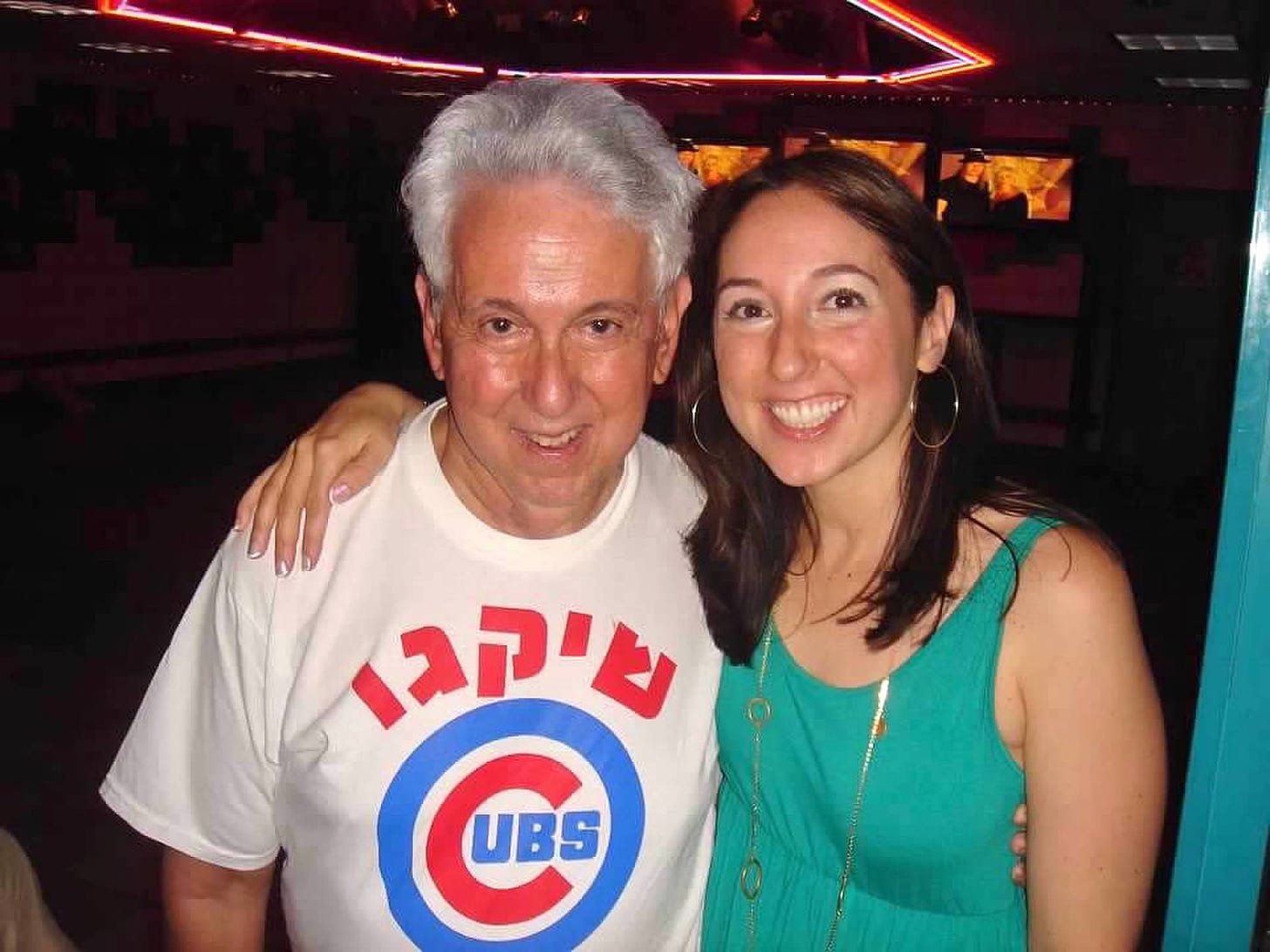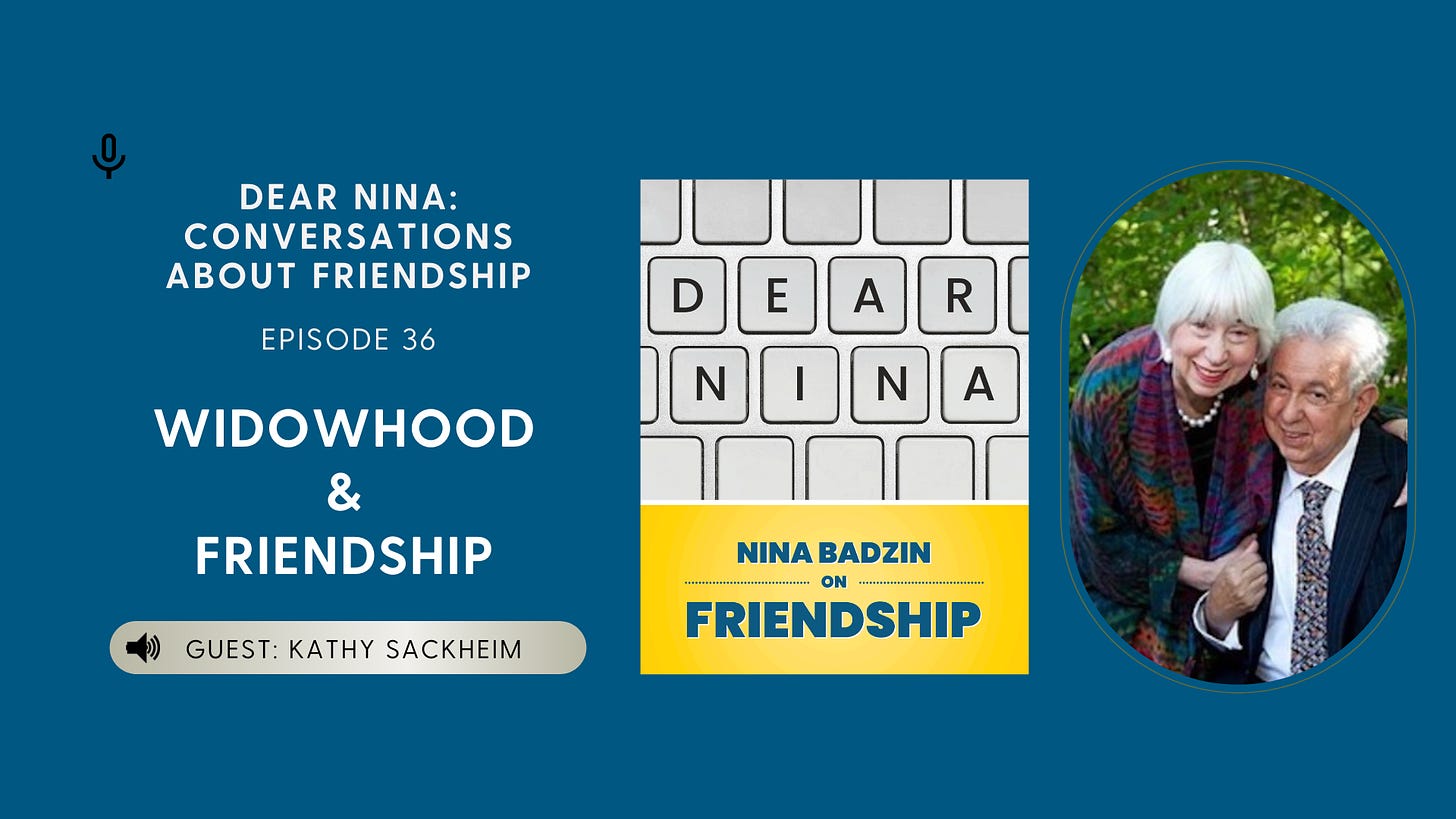My mom was 54 and my dad was 58 when he was diagnosed with Parkinson’s Disease in 1998. My sisters and I used to wonder why he was always dragging his leg. He wondered, too. But our dad was so active as a tennis player and a runner that it seemed plausible he had injured himself.
After many tests looking for the problem, it was the orthopedist who told my dad he needed to see a neurologist. The persistent unusual gait, it turned out, was a symptom of Parkinson’s.
Two years after the diagnosis, he could still walk me down the aisle at my wedding with a bit of a limp. And he could dance.
The next years brought on a cane, then a walker, and around the 11-year mark—a wheel chair.
He had lived with Parkinson’s for 23 years by the time he died this past December.
As my mom explains in episode 36 of Dear Nina, “Widowhood and Friendship,” my parents traveled widely and stayed active for as long as they could while he was able to get around easily and even long after it was getting difficult.
They made it a priority, always, to spend time with good friends until the very end.
Some of what my mom experienced caring for a spouse with a chronic and degenerative illness prepared her for widowhood. She had already taken on most of the bills, for example. Other parts, like the silence and loneliness, were new.
I hope you’ll listen to the 20-minute episode with my mom where she shares her experience making friends as a young bride (she was a junior at Northwestern when she got married) and the ways friends were central to my parents’ marriage through the healthy years, the years my dad struggled, and now for my mom as a widow.
She has excellent friends because she’s been an excellent friend. It’s a lesson for all of us!
Know Your Financial Information and Your Advisors!
One anonymous listener who heard the episode also lost her husband after a many-decades long marriage. She wanted to expand on some of the financial points my mom touched on.
"Many women have either not been interested or have spouses who have not shared information about their finances. This is hugely important because, especially if a spouse dies suddenly or one faces divorce, they don’t have the first idea about anything from how to balance a check book (manually or digitally) to mortgages, life and health insurance, stock portfolios, to knowing where everything is.
It is crucial to learn about the people who run one’s affairs (management advisors, stock brokers, attorneys, accountants, etc.) while a spouse is still around—both physically and mentally. If you haven’t met these advisors personally, you certainly need to know who to contact in an emergency.
If you don’t feel comfortable with the advisors your spouse has chosen, ask to find new people who also have your best interests in mind, who can present information in plain English and not “investment speak” and who will be available in an emergency.
This might surprise you, but many, many women either don’t know, don’t care, or claim that their spouses find this proprietary information and refuse to share. At the very least, if a spouse feels this way, everything should be in writing with easy access for the spouse and adult children.
I also heard from a younger widow with experiences she felt could help listeners and readers.
Debra Weiss Zwiefelhofer, wrote:
"At the age of 49, I find myself a widow after my husband lost his valiant battle with late stage cancer in August. My friends have been my lifeline for helping me get through this most difficult time. I’d like to share some ideas on what friends can do for young widows. I know your mom was older when her husband passed, and while we have similar feelings of grief, there are different considerations for a young widow. For example, I can't say yes to every social event when I'm still working, taking care of the house, and raising my daughter.”
I was eager to hear more of Debra’s ideas. As a side note, Debra is working on a book about death and grief, and I hope to hear more from her when the book is ready.
From Debra:
The following is a list of gestures my friends did for me during my husband's disease and after his passing that really helped.
When I first received the news about my husband's cancer diagnosis, one of my dear friends simply sat with me in silence, held my hand, and cried with me. I realize not everyone has the capacity to do that, but her willingness to sit with me in silence was really helpful. Quite frankly, there are some things that don't have solutions and words are not always required.
Throughout my husband's illness, people felt so helpless and their standard reaction was to bring over food. While the gesture was very much appreciated, at some point, it became overwhelming. A better approach was when my friends would text me and ask what I needed. During those times, I responded with practical tasks, such as picking up milk, eggs, or a copper scrubber. One friend brought me plastic gloves, which came in handy when I was caring for my husband.
I really appreciated those friends and family members who were willing to come to my house to actually visit with my husband during his illness. I know it is a difficult thing to do, particularly when the person is looking frail or otherwise showing physical signs of the illness, but we all appreciated the company and conversation, including the visitors. I can confirm that it is much less scary to visit with someone who is terminal than people think.
After his passing, my close friends handled all of the details for food at the gathering after the funeral (the shiva), stayed to set up the food, served the guests, and even cleaned up afterwards. That was such a godsend.
I would caution against sending texts or emails with multiple, rapid-fire questions, asking about how I am doing. I know these friends are well-intentioned and want me to know they are are thinking about me and my family, but sometimes those kinds of communications can be overwhelming because it takes more energy to respond than to send the questions. I much prefer for someone to reach out to me via text to set up a time to talk, so that I can schedule the time and have a real conversation.
Since the funeral and now that some months have passed since he died, I've appreciated those friends who think of me and offer to include me in their plans. I also appreciate it when they are okay if I decline. I have not yet been brave enough to go out with a friend and her husband as a group of three. I am not sure if I will ever want to do that, but I appreciate that they offer.
Now that it is only my daughter and me in the household (my son is currently at college), I have very much appreciated those friends who put me in touch with their husbands for things like household repairs, major decisions about the home (buying a roof or installing a driveway—both things I have recently had to address), or manual labor, i.e., snow blowing or getting items down with a ladder).
People often say "I am sorry to make you sad" by bringing up his passing, or "I can't imagine what you are going through." As to the first sentiment, I think it is important to realize that sadness is a valid emotion that should not be avoided or bottled up. It is really healthy to feel sadness after a death and to cry. No one should ever apologize for making me feel sad. I want to talk about my husband, and if for some reason I don't, I will say so.
As for saying that they are not able to imagine what I am going through, I find that statement a bit off-putting. In order to provide comfort to a person who is grieving, I think it is important to try to imagine what I'm going through. We all have lost loved ones and most of us have experienced grief. I think everyone actually can probably imagine how it feels. Saying that they can't imagine it puts distance between that person and me, and makes me feel isolated and lonely. If possible, I would avoid saying something like this.
Thank You For Responding
I am so grateful when listeners respond to episodes or newsletters to add more information and resources for others in the Dear Nina community. I do feel a community forming here through Substack where I will be starting virtual hangouts and a book club for founding members, in the Facebook group, and even locally when people tell me an episode helped.
We all struggle with friends at some point or another. We’re here to help each other!
Support a Great Local Book Store
Did you know that Dear Nina readers and listeners now get 10% off all online orders at my favorite local Minneapolis book store, Cream & Amber. Use the code “dearnina” at checkout. It’s a great place for gifts and a nice way to support a local business.
Using my code also helps support the show and my work. So thank you for considering Cream & Amber for your book buying!
Check out the books I recommend often these days!
And here’s my 2022 reading list so far.
ASK AN ANONYMOUS QUESTION ANY TIME!
JOIN THE DEAR NINA FACEBOOK GROUP!
FOLLOW ALONG ON INSTAGRAM







